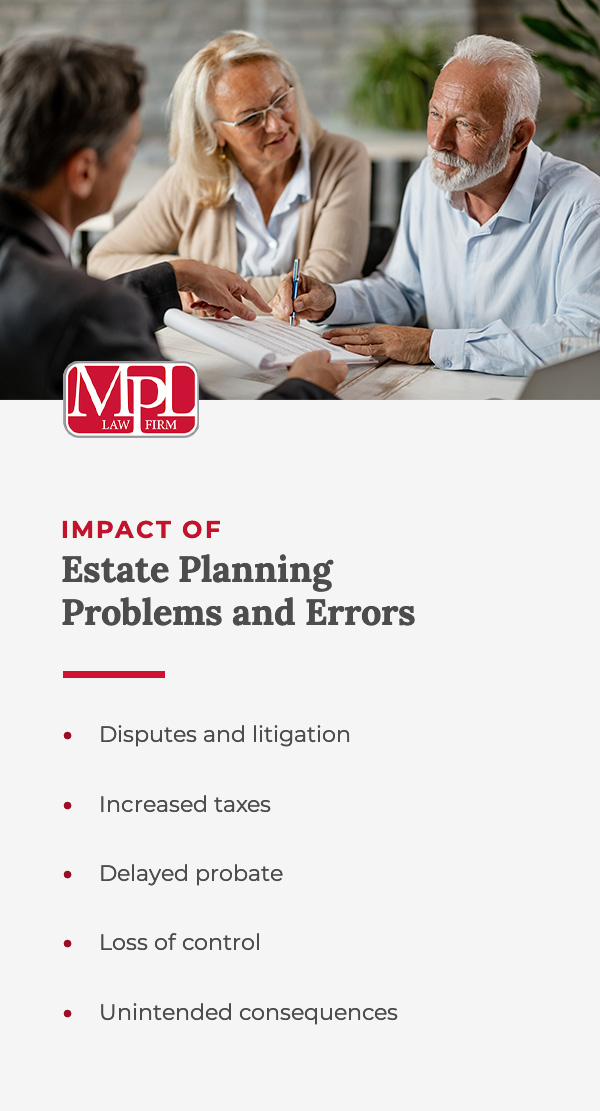Estate Planning Mistakes
UPDATED JULY 5, 2023
Estate planning is an essential part of promoting general wealth and harmony for individuals and families. It involves preparing for the management and distribution of your assets in the event of your death or incapacity. Some mistakes are common during state planning, which can lead to unintended consequences, family disputes and potentially even legal battles.
Below, we cover some of the most common estate planning mistakes and how to avoid them. By understanding these mistakes and taking the necessary steps to avoid them, you can ensure your estate is distributed according to your wishes and that your loved ones are protected.
Common Estate Planning Mistakes
If you intend to create an estate plan, there are several common estate planning mistakes to be aware of, such as:
- Lacking a will or estate plan: One of the most common estate planning mistakes is not having a will or estate plan in place. Without a will, your assets will be distributed according to state law, which may not align with your wishes.
- Failing to update estate planning documents: Another common mistake is failing to update estate planning documents after a significant life event, such as a marriage, divorce, birth of a child or death of a beneficiary.
- Choosing the wrong executor or trustee: It’s important to choose an executor or trustee who is trustworthy, responsible and capable of handling the responsibilities of managing your estate or trust.
- Not considering tax implications: Failing to consider tax implications can result in your estate paying unnecessary taxes or your beneficiaries receiving a smaller inheritance than you intended.
- Forgetting to plan for incapacity: It’s essential to have a plan in place for what happens if you become incapacitated and cannot make decisions for yourself. This can include appointing a power of attorney or creating a living will.
- Not coordinating beneficiary designations: Failing to coordinate beneficiary designations on retirement accounts and life insurance policies can result in unintended consequences, such as disinheriting a loved one or leaving assets to someone who is no longer alive.
- Failing to consider the impact of long-term care costs: Failing to plan for the cost of long-term care can result in your assets being depleted quickly, leaving little to pass on to your beneficiaries.
Working with an experienced estate planning attorney can help you avoid these common mistakes and ensure your wishes are carried out correctly.
How to Avoid Beneficiary Mistakes in Estate Planning
Estate planning is an essential process for anyone who wants to ensure that their assets are distributed according to their wishes after their death. However, even the most carefully crafted estate plans can be undermined by beneficiary mistakes. Here are some tips to help you avoid beneficiary mistakes in estate planning:
1. Designate the Right Beneficiary or Beneficiaries
You may want to leave your children a large sum of money, but consider whether you believe they can handle these funds responsibly. Determining your beneficiaries requires an honest assessment of everyone you plan to include. Consider family politics as well, as frustrating as they may be. If you have family members who don’t trust each other, you may need to consider leaving them out of your estate.
Review your beneficiary designations regularly. Make sure your beneficiary designations are up-to-date and reflective of your current wishes. Life changes, such as marriage, divorce, the birth of a child or grandchild and death, can all impact your beneficiary designations.
2. Consider Trust and Fairness for Your Executor
The executor of your estate doesn’t have to be your eldest child or another arbitrary designation. Think about the person you most trust to handle a sensitive matter in your life right now. Even if that’s a family friend, you may want to choose them as your executor rather than a family member. Just make sure your executor is a person whom your entire family trusts. This will help prevent issues as the will is executed.
3. Update Your Retirement Accounts
Too often, when individuals leave their jobs or take their retirement, they neglect to update the beneficiaries on their 401(k) or other retirement plans. Revisit these designations to ensure your first spouse or a sibling you are no longer on good terms with is not named the beneficiary. This may lead to chaos and conflict when you are gone.
4. Update Your Insurance Policies
You should also check the beneficiaries of any life insurance policies and look at the total worth of those policies. Consider whether you can adjust your policies to better aid your beneficiaries. Ensure your beneficiaries also understand the tax liabilities associated with the policies.
5. Address What to Do if a Beneficiary Passes Away
If you have designated someone as a beneficiary and they pass away, immediately update your estate, your 401(k) plan and your insurance policies. Failing to do so can lead to your money going to the estate of the late beneficiary instead of a beneficiary who could use the assistance your estate could provide.
Consider naming contingent beneficiaries in case your primary beneficiaries predecease you or are unable to inherit for any reason.
6. Rethink Selling Your Property for a Small Sum
If you have considered selling your $500,000 house to your child for a dollar in an effort to get the most for your beneficiaries, this tactic could backfire. The government understands that the value of your house is actually much more than a dollar, so it will treat your generosity as a taxable gift to your child and that could result in bills they cannot pay.
7. Beware of Large Taxes When Reselling Your Home
Unfavorable taxes may occur with just about any transaction, so discuss anything you plan to do with your house with a tax attorney ahead of time to avoid significant penalties for yourself or your beneficiaries.
8. Update Asset Ownership
If you have gotten remarried since buying your home or you sold a car to your grandchild but neglected to turn over the deed, now is the time to get these items in order. Estate planning can get complicated when asset ownership claims are disputed. Find the most favorable arrangements for your family when updating these assets, such as putting your new spouse’s name on a mortgage.
9. Make Sure Assets Going to a Minor Mention Their Guardian
If you plan to leave an asset to a minor, such as a car to your 16-year-old granddaughter, make sure your estate names her guardian as well. You may also choose to set up a trust for the child and designate someone to oversee it.
10. Include a Residuary Clause
Each person’s will should include a residuary clause, which covers the property not specifically mentioned in your estate plan. It covers everything that remains when all your bequests and gifts have been accounted for. You can designate beneficiaries for this as well.
11. Be Specific
Be clear and specific in your beneficiary designations. Avoid using broad terms like “children” or “grandchildren” if you want to leave assets to specific individuals. If you have multiple beneficiaries, consider dividing your assets into specific percentages or dollar amounts to ensure that each beneficiary receives a fair share.
12. Communicate With Your Beneficiaries
Communicate your wishes to your beneficiaries to avoid misunderstandings or disputes. Discuss your estate plan with your beneficiaries, and let them know how you want your assets to be distributed.
13. Seek Professional Guidance
Consider seeking an experienced estate planning attorney or financial planner’s help to ensure your beneficiary designations align with your overall estate plan. Connecting with a professional can help you evaluate which estate planning vehicle, such as a will or trust, is best for you and your situation.
By following these tips, you can help avoid beneficiary mistakes in estate planning and ensure your assets are distributed according to your wishes.
Impact of Estate Planning Problems and Errors
Estate planning errors can have significant consequences for both you and your family. Some potential impacts of estate planning errors include:
- Disputes and litigation: One of the most significant impacts of estate planning errors is that they can lead to disputes and litigation among family members or beneficiaries. This can be particularly true if there are ambiguities or inconsistencies in the estate planning documents or if there is a perceived unfairness or inequity in how the assets are distributed.
- Increased taxes: Another potential impact of estate planning errors is that they can lead to increased taxes for the estate or beneficiaries. For example, if you don’t take advantage of tax-saving strategies like gifting or charitable donations, your estate may be subject to higher taxes.
- Delayed probate: Estate planning errors can also lead to delayed probate, which can cause significant stress and financial hardship for family members. Probate is the legal process of distributing an individual’s assets after they pass away. If there are errors in the estate planning documents or if there is a dispute among family members, probate can be delayed for an extended period, leading to uncertainty and financial strain.
- Loss of control: Estate planning errors can also result in a loss of control over your assets. For example, if you don’t update your estate planning documents after a significant life event like a divorce or the birth of a child, your assets may not be distributed in the way you would have wanted.
- Unintended consequences: Estate planning errors can lead to unintended consequences, such as disinheriting a loved one, leaving assets to someone who is no longer alive or failing to provide for a dependent. These unintended consequences can cause significant emotional pain and financial hardship for those involved.
Estate planning errors can have significant and long-lasting impacts on you and your family. It’s essential to work with an experienced estate planning attorney to ensure your wishes are carried out correctly and that your loved ones are protected.
Hire an Attorney to Avoid Estate Planning Issues
Elder estate planning can be challenging for those without legal experience. At MPL Law, we provide legal services in several areas, including trust and estate planning. We can help you avoid estate planning issues by providing you with advice and guidance on how to protect your assets and ensure your wishes are carried out after your passing.
To hire an attorney from MPL Law to assist you with estate planning, you can contact our office to schedule a consultation and discuss your estate planning needs and concerns with an attorney. We can then advise you on the best course of action for your specific circumstances.







Leave a Reply